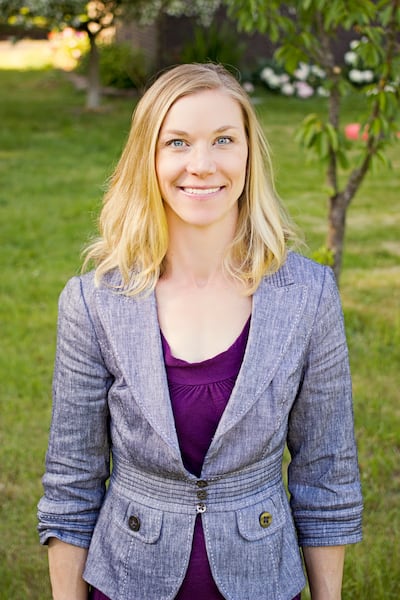When Ashley Bohanan moved her family into the West Linn-Wilsonville School District during the summer of 2020, she quickly spotted a problem.
Bohanan watched as her kindergartner and second grader learned to read virtually. A speech pathologist by day, she says she’s familiar with how letter correspondence, phonemic awareness, and sounds are supposed to be taught. “I realized quickly that that wasn’t the focus at all,” she says. “It wasn’t done at all.”
A few years later, as her younger child continued to struggle, Bohanan started looking deeper into how the district had been teaching him how to read. She realized that the district’s reading curriculum wasn’t on the Oregon Department of Education’s approved curriculum lists.
The district’s main reading curriculum, the Lucy Calkins Units of Study, promoted “balanced literacy,” a method that promotes reading instruction based on deciphering context, among other strategies. Sold a Story, a podcast by American Public Media, reported that Calkins’ curriculum had deemphasized phonics-based instruction, which is widely understood as crucial to teaching kids to read.
As Oregon Public Broadcasting first reported two years ago, West Linn-Wilsonville School District administrators acknowledged that “years ago, their predecessors didn’t completely follow the compliance process” around curriculum. The district adopted a new, compliant reading curriculum in spring 2024 and implemented it for this academic year.
But parents say the district should still be held accountable for those years when it was out of compliance. (Exactly how many years remains a matter of dispute.) They say the district should be required to share its mistakes with the public through a formal corrections process.

Bohanan and parent Rebecca Puskas have filed a series of complaints with the district and the Oregon Department of Education. They say their struggle identifying and changing noncompliant curricula also raises larger questions about why ODE isn’t holding districts accountable to standards it has set.
The pair first filed a complaint with ODE on March 10, 2024, alleging the district had violated Division 22 standards. (Those are statewide requirements that school districts must meet in a number of categories, including curriculum adoption.) But on Dec. 13, ODE closed the parents' case, writing that even though West Linn-Wilsonville had used noncompliant curricula, it now was in compliance and the discussion about whether it had previously met state standards was moot.
On Feb. 4, Bohanan and Puskas filed a petition for reconsideration with ODE and say they’ll take their case to court if it’s denied.
Lara Hruska, an education lawyer and founding partner at Cedar Law LLC, is representing the parents in their petition to ODE and says the department’s decision is “notably opaque and unhelpful.” In fact, the ODE decision doesn’t even say which curricula were beneath its standards.
“A problem with the ODE finding is that it just obfuscates. It says, yeah, noncompliant, but don’t worry about it,” Hruska says. “This is exactly why we’re asking them to reconsider another process, because we want to shine a light on what was noncompliant.”
Hruska says the case matters because it points to a question of accountability for student results—an ideal the state has talked a lot about recently but isn’t acting upon.
“Even when they find noncompliance, [the department] is sweeping it under the rug,” Hruska says.
ODE spokesman Peter Rudy says the department is currently reviewing the parents’ request and considering their arguments.
West Linn-Wilsonville spokesman Andrew Kilstorm says the noncompliant materials in the parents' complaint were from a previous seven-year adoption cycle and approved independently by the district’s school board for adoption. “That was a common practice at the time,” he says.
“ODE staff confirmed that the district was in compliance,” Kilstorm tells WW. “ODE is not pursuing this complaint because there is nothing to pursue.”
Currently, ODE monitors district compliance with its curriculum standards in three ways. Complaints, like the ones the parents filed, are one of them. The department also engages in “ongoing coaching and professional learning,” Rudy says. The final piece is what alarms the parents: official assurances by school districts that they are upholding the standards. In reports to ODE, districts certify themselves as compliant or noncompliant with each standard.
“Once ODE has received all of the assurances, staff go through a process of following up with districts that have self-reported noncompliance,” ODE’s website states. It adds: “School districts are presumed to be in compliance until a deficiency is found.”
Hruska says that an honor system is not the best way to hold school districts accountable—especially for districts that have been noncompliant in the past.
“If our real goal is transparency and accountability, relying on self-report or relying on third-party complaints is not a proactive, affirmative, preventive way to ensure that districts are complying,” Hruska says. “My concern is that ODE is more interested in covering for districts, and obfuscating or shifting the focus, when some real transparency and accountability would serve everyone.”
Rudy, the ODE spokesman, says all curricula on the department’s approved list are research aligned. He says that at this time, K-5 English language arts instructional materials are being tracked across districts. (The Oregonian reported the database for these materials does not show whether they meet research standards.)
Rudy adds that districts that use Early Literacy Success Initiative grant funds to purchase materials must, beginning in July 2025, adopt materials from the state’s approved list.
“We know that access to high-quality instructional materials matter and can be a strong lever for students' learning,” he says.
Puskas and Bohanan both expressed worry that similar patterns of noncompliance could be happening at other school districts, and that ODE’s current process of monitoring compliance could miss them. (At 55%, West Linn-Wilsonville’s third grade reading proficiency rate during the 2023-24 academic year is well above the statewide average of 40%.)
“We are one of the most well-resourced districts in the state, and so if it’s happening at our district, I can’t imagine it’s not happening in others,” Puskas says. “The fundamental problem is that ODE doesn’t even have the information to check right to know whether the standards are being met. And that’s, I think, hugely problematic.”
